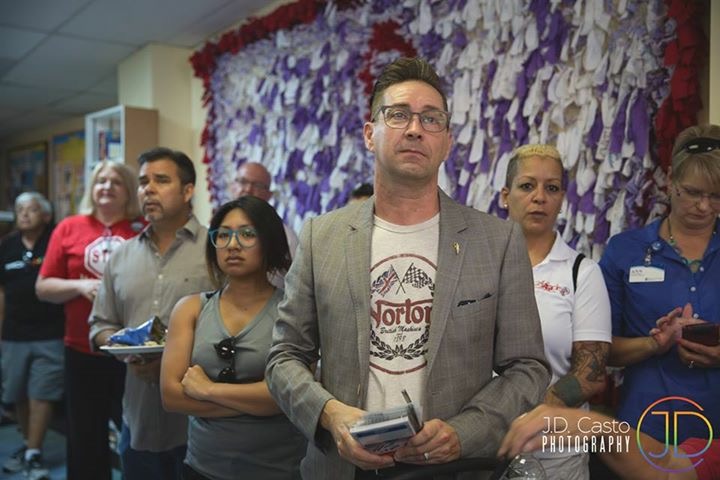
John Super (center) watches the news with other volunteers in the LGBT Center in Orlando after the Pulse nightclub shooting.
Several months have passed since a gunman killed 49 people and wounded 53 at the Pulse nightclub in Orlando in what was the deadliest mass shooting in U.S. history — a horrific tragedy the likes of which rarely strikes so close to the University of Florida.
While the trauma of the lives lost will long linger in the minds of survivors, family and friends of the victims, the aftermath also has brought the Orlando community together in a cause for hope and unity. Citizens donated blood, stood together on social media and held vigils.
They were supported by sympathizers across Florida and the country, including a contingent of students and faculty members from UF College of Education who personally visited Orlando to assist in the communitywide effort to provide counseling and mental health care to those affected by the deadly shooting.
“This event had a huge impact on me as a counselor, a student and a person,” said Rachel Henesy, a UF doctoral student in counselor education. “On a personal and professional level, I felt a responsibility to help in any way possible.”
About 30 UF volunteers
The UF effort was spearheaded by John Super, a clinical assistant professor of counselor education, who in the days after the tragedy helped recruit and organize about 30 UF counselors and students to travel to Orlando for one-on-one counseling sessions. They helped people coping with intense feelings — such as loss, anger and fear, provided referrals to local licensed therapists and served as an emotional outlet for those experiencing their darkest days.
It has been said that out of deep pain and grief there is hope and opportunity. That is what Super found when he asked his UF students and peers from around the state to contribute to the volunteer counseling efforts.
“In the beginning, there was a moment where I thought I could either volunteer or not,” Super said. “But I knew I had to do something, and at that moment I had no idea the magnitude the tragedy would become.”
Super worked with local volunteer counseling coordinators, including David Baker-Hargrove and Lindsay Kincaide of Two Spirit Health Services in Orlando, to develop a response plan. He also coordinated with Alicia Homrich, a professor of graduate studies in counseling at Rollins College in Winter Park, who provided resources and also recruited Rollins students, Kincaide said.
The Lesbian, Gay, Bisexual, Transgender Community Center of Central Florida served as the base of operations, with other free counseling locations established throughout the Orlando area, including LGBT-friendly bars. All told, nearly 700 people — ranging from licensed counselors, psychologists, pet therapists, interpreters and social workers — volunteered their time in the days and weeks following the shooting to assist hundreds of people from June 12 to July 4, Kincaide said.
Ties to the LGBT community
Super was well equipped to help with the grassroots counseling efforts. He has master’s in marriage and family therapy and a Ph.D. in counselor education from the University of Central Florida in Orlando, and has ties to Orlando’s LGBT Community Center. He also has Red Cross training in disaster response for mental health care and has conducted research in the identity development of LGBT individuals.
In the days after the tragedy, Super tapped his counseling connections, Orlando ties and experience in crisis intervention counseling to help address the widespread grief and fear of area residents — including a large contingent of the gay and Hispanic communities. He posted information on social media sites and sent emails to UF students and counselors asking for their help. Most not only were willing to volunteer but also shared his message to recruit others.
Though so many felt shock and heartbreak, Super said he witnessed a tremendous amount of goodness, too. He saw graduate students counsel those affected by the tragedy, and he encouraged conversation among the students to share their stories and feelings, and learn from each other’s experiences.
“I experienced such an outpouring from master’s and doctoral students who were willing to give their time and really put themselves out there driving from Gainesville to Orlando every day,” he said. “They put their own feelings and grief aside in order to help those who most needed it.”
Henesy, the UF doctoral student in counselor education, said she was grateful that Super was able to assess what was needed and get UF students and his peers involved.
Another counselor education doctoral student, Philip Daniels, said the College of Education gave him the foundation and confidence to provide the support needed for those processing the event.
“One of the first thoughts that went through my head was competency,” Daniels said. “I asked myself, ‘can I really do this?’ Then, it dawned on me. This is what I am trained for. This was a moment when everything I have learned came together so I could serve others in their time of need.”
Super said LGBT counseling has long been a staple of UF’s counseling education curriculum. Diversity and social justice is weaved into all of the counselor education courses, and LGBT issues are addressed through role-playing and discussions in every foundational class and clinical experience.
“Historically, we were one of the first several counselor education programs in the nation,” Super said. “We’ve always had a strong social justice focus that is supported by the college and our profession.”
Source: John Super, UF College of Education; 352-273-4325; jsuper@coe.ufl.edu
Writer: Kelsie Ozanne, news and communications office, UF College of Education; kozanne@ufl.edu
Media Relations: Larry Lansford, director, news and communications, UF College of Education; 352-273-4173; llansford@coe.ufl.edu